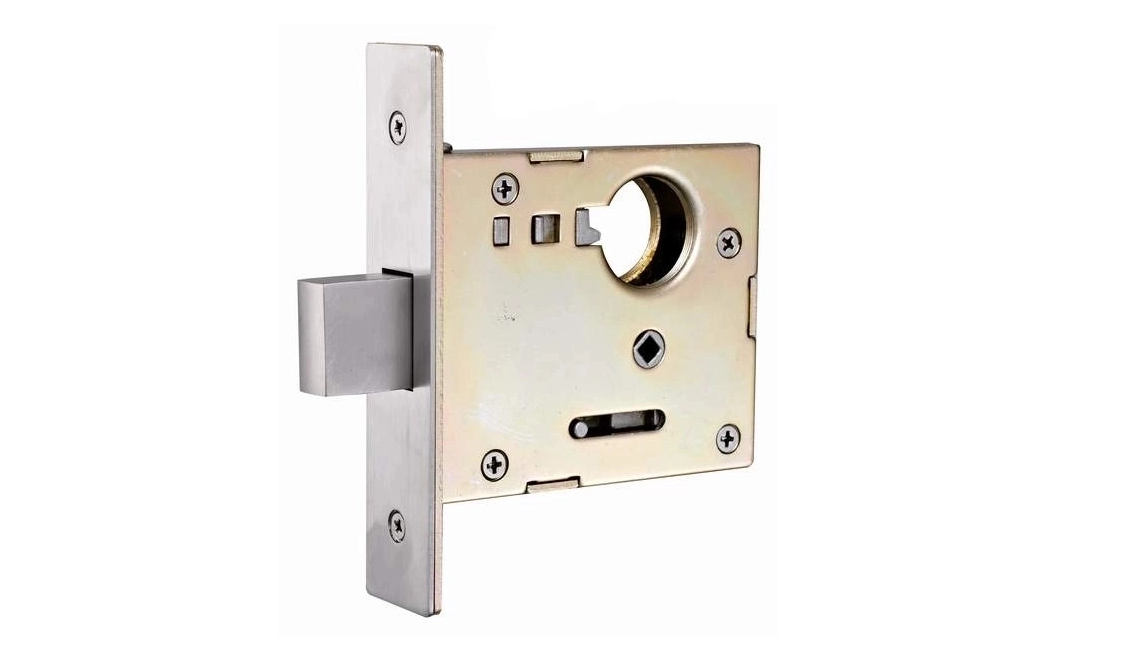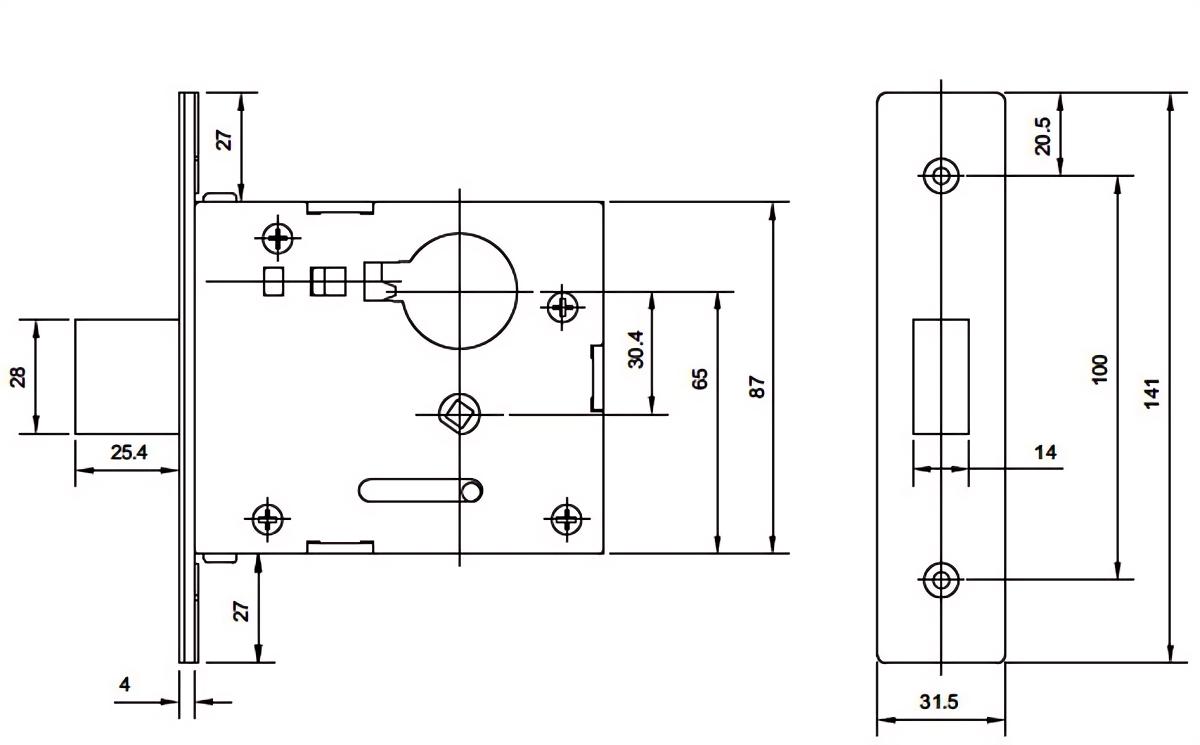Selecting the right locks for your business isn't just about keeping intruders out—it's about finding the perfect balance between security, durability, and cost-effectiveness. The American National Standards Institute (ANSI) has established clear grading systems to help business owners make informed decisions about their security hardware.
ANSI lock grades range from Grade 3 (basic residential use) to Grade 1 (maximum security commercial applications). For most businesses, the choice comes down to Grade 2 and Grade 1 locks. Both offer commercial-grade security, but they serve different purposes and budgets.
Understanding the differences between these two grades can save your business thousands of dollars while ensuring adequate protection for your assets, employees, and customers. This guide will break down everything you need to know about Grade 2 commercial locks versus Grade 1 options, helping you make the smartest choice for your specific business needs.
Understanding ANSI Lock Grades
The ANSI/BHMA (Builders Hardware Manufacturers Association) grading system evaluates locks based on three critical performance areas: operational testing, security testing, and finish durability. Each grade represents a specific level of quality and expected performance.
ANSI Grade 1 locks represent the highest commercial standard, designed for heavy-duty applications with maximum security requirements. These locks undergo the most rigorous testing protocols and must meet strict performance benchmarks.
Grade 2 commercial locks sit in the middle tier, offering substantial security and durability while remaining cost-effective for many business applications. They provide commercial-grade protection without the premium price tag of Grade 1 hardware.
Grade 3 locks, while not covered in detail here, are primarily intended for residential use and light commercial applications where security demands are minimal.

Grade 2 Commercial Lock Specifications
Grade 2 commercial locks must withstand 400,000 lock and unlock cycles during operational testing. This translates to approximately 10-15 years of typical commercial use, depending on traffic volume and usage patterns.
Security testing for Grade 2 locks includes door strike tests where the lock must withstand five strikes of 40 foot-pounds of force. The lock cylinder must also resist drilling, picking, and other common attack methods for a specified duration.
Finish durability testing ensures Grade 2 locks maintain their appearance and function after exposure to salt spray, humidity, and temperature variations. This makes them suitable for most indoor commercial environments and some protected outdoor applications.
The operational force required to turn a Grade 2 lock cannot exceed 15 inch-pounds for the thumb turn and 45 inch-pounds for the key operation. These specifications ensure the locks remain user-friendly while maintaining security standards.
Grade 1 Lock Performance Standards
Grade 1 locks must endure one million operational cycles—more than double the Grade 2 requirement. This exceptional durability makes them ideal for high-traffic commercial environments like office buildings, retail stores, and institutional facilities.
Security testing for Grade 1 locks is significantly more demanding. They must withstand 10 door strike tests at 75 foot-pounds of force each. The enhanced cylinder security requires resistance to more sophisticated attack methods for extended periods.
Grade 1 locks also feature superior construction materials and tighter manufacturing tolerances. The internal components are typically made from stronger alloys and undergo more precise assembly processes.
Environmental testing for Grade 1 hardware includes more extreme conditions, making these locks suitable for outdoor installations and harsh commercial environments where Grade 2 locks might fail prematurely.
When Grade 2 Commercial Locks Make Sense
Grade 2 commercial locks excel in moderate-traffic business environments where security is important but extreme durability isn't critical. Small to medium-sized offices, retail shops, and professional services often find Grade 2 locks provide excellent value.
Budget considerations frequently favor Grade 2 options. The cost difference between Grade 2 and Grade 1 can be substantial when outfitting multiple doors throughout a commercial property. For businesses with limited security budgets, Grade 2 locks offer commercial-grade protection at a more accessible price point.
Interior doors within commercial buildings are prime candidates for Grade 2 commercial locks. These applications typically experience lower stress levels than main entry doors while still requiring commercial-grade security features.
Professional office suites, medical practices, and similar businesses often find Grade 2 locks perfectly adequate for their security needs. The combination of reasonable cost, good security, and adequate durability makes them an attractive choice.
Grade 1 Lock Applications
High-traffic commercial environments demand Grade 1 performance standards. Shopping centers, office buildings, schools, and hospitals benefit from the extended operational life and enhanced security features of Grade 1 hardware.
Main entry doors and other high-security areas should typically use Grade 1 locks. The superior strike resistance and advanced cylinder security provide maximum protection against forced entry attempts.
Outdoor applications often require Grade 1 locks due to their enhanced environmental resistance. Weather exposure, temperature fluctuations, and UV radiation can compromise lesser hardware over time.
Government buildings, financial institutions, and healthcare facilities frequently specify Grade 1 locks to meet insurance requirements and security regulations. The enhanced performance standards align with the elevated security needs of these sensitive environments.
Cost Analysis and ROI Considerations
Initial hardware costs represent only part of the total investment equation. Grade 2 commercial locks typically cost 40-60% less than comparable Grade 1 units, making them attractive for budget-conscious installations.
Long-term maintenance and replacement costs can shift the economic equation. Grade 1 locks may cost more upfront but often provide better value over their extended service life, especially in demanding applications.
Labor costs for installation and maintenance remain similar between grades, meaning the hardware price difference directly impacts project budgets. However, premature replacement of Grade 2 locks in inappropriate applications can eliminate initial savings.
Insurance considerations may influence the cost analysis. Some commercial insurance policies offer premium reductions for businesses using Grade 1 security hardware, potentially offsetting the higher initial investment over time.
Making the Right Choice for Your Business
Traffic volume analysis should guide your lock grade selection. Count the number of daily lock operations for each door to determine whether Grade 2 durability will prove adequate over your intended service life.
Security risk assessment helps identify doors requiring maximum protection versus those where Grade 2 commercial locks provide sufficient security. Consider the value of assets being protected, the consequences of security breaches, and your local crime environment.
Environmental factors play a crucial role in lock selection. Indoor applications with controlled climates favor Grade 2 options, while outdoor or harsh environment installations typically benefit from Grade 1 specifications.
Future expansion plans should influence current decisions. Businesses expecting growth or increased security demands might benefit from installing Grade 1 locks initially rather than upgrading later at higher total cost.

Your Next Steps for Better Business Security
Selecting between Grade 2 commercial locks and Grade 1 options requires careful consideration of your specific business needs, budget constraints, and long-term objectives. Grade 2 locks provide excellent value for many commercial applications, while Grade 1 hardware delivers maximum performance for demanding environments.
Start by conducting a thorough security assessment of your facility, documenting traffic patterns, environmental conditions, and security requirements for each door. This information will guide your lock grade selection and ensure optimal performance.
Consider consulting with a commercial locksmith or security professional to review your specific needs and local conditions. Their expertise can help identify potential issues and ensure your lock selection aligns with industry best practices and local security requirements.
Remember that the right lock grade depends entirely on your unique circumstances. The best choice balances security requirements, durability needs, and budget constraints while providing reliable protection for your business assets and personnel.
Grade 2 Commercial Lock
Commercial Lock
ANSI Door Lock
English
العربية
Français
Русский
Español
Português
Deutsch
italiano
日本語
한국어
Nederlands
Tiếng Việt
ไทย
Polski
Türkçe
አማርኛ
ພາສາລາວ
ភាសាខ្មែរ
Bahasa Melayu
ဗမာစာ
தமிழ்
Filipino
Bahasa Indonesia
magyar
Română
Čeština
Монгол
қазақ
Српски
हिन्दी
فارسی
Kiswahili
Slovenčina
Slovenščina
Norsk
Svenska
українська
Ελληνικά
Suomi
Հայերեն
עברית
Latine
Dansk
اردو
Shqip
বাংলা
Hrvatski
Afrikaans
Gaeilge
Eesti keel
Māori
සිංහල
नेपाली
Oʻzbekcha
latviešu
অসমীয়া
Aymara
Azərbaycan dili
Bamanankan
Euskara
Беларуская мова
भोजपुरी
Bosanski
Български
Català
Cebuano
Corsu
ދިވެހި
डोग्रिड ने दी
Esperanto
Eʋegbe
Frysk
Galego
ქართული
guarani
ગુજરાતી
Kreyòl ayisyen
Hausa
ʻŌlelo Hawaiʻi
Hmoob
íslenska
Igbo
Ilocano
Basa Jawa
ಕನ್ನಡ
Kinyarwanda
गोंगेन हें नांव
Krio we dɛn kɔl Krio
Kurdî
Kurdî
Кыргызча
Lingala
Lietuvių
Oluganda
Lëtzebuergesch
Македонски
मैथिली
Malagasy
മലയാളം
Malti
मराठी
ꯃꯦꯇꯥꯏ (ꯃꯅꯤꯄꯨꯔꯤ) ꯴.
Mizo tawng
Chichewa
ଓଡ଼ିଆ
Afaan Oromoo
پښتو
ਪੰਜਾਬੀ
Runasimi
Gagana Samoa
संस्कृत
Gaelo Albannach
Sepeti
Sesotho
chiShona
سنڌي
Soomaali
Basa Sunda
Wikang Tagalog
Тоҷикӣ
Татарча
తెలుగు
ትግንያውያን
Xitsonga
Türkmençe
संस्कृत
ئۇيغۇرچە
Cymraeg
isiXhosa
ייִדיש
Yorùbá
isiZulu







































